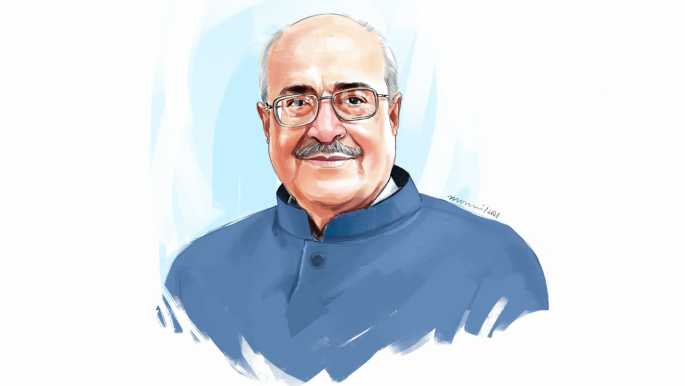The country will not be able to sustain the development it made in the past decade and a half unless. All political forces come to an agreement for holding a participatory election. Said Dr Debapriya Bhattacharya, a distinguished fellow at the Centre for Policy Dialogue (CPD).
Achieving targets like the implementation of sustainable development goals (SDGs). The transition from the least developed country (LDC) status to a developed country by 2041. Will become very problematic if inclusive elections are not held through political consensus, he said. A session on the second day of the Sanem Annual Economists’ Conference 2023.
Development won’t sustain sans political consensus: Debapriya
„Social forces come forward when political forces do not compromise. Students’ safe road movement and anti-VAT movement are part of this,” he said.
The sixth edition of the conference is being held at the Brac Centre Inn in the capital under the slogan of „Building Resilience to Shocks: Priorities, Challenges and Prospects”.
Professor Rounaq Jahan, a distinguishe fellow of the CPD, chaired the session titled „The power dynamics between state and business: how is capitalism evolving in Bangladesh?”
Development won’t sustain sans political consensus: Debapriya
In his panel speech, Debapriya said, in 1991, a non-partisan government was formed in light of the outline given by civil society. Despite a questionable election in 1996, a caretaker government was formed through political compromise.
So, political problems have been solved through consensus in the past, he said, adding that the country’s power went to the hands of the army in 2006 mainly due to a lack of political agreement.
Dr Mirza M Hassan, a senior research fellow at the Brac Institute of Governance and Development (BIGD), presented a paper titled „State-Business Relations and the Nature of the Evolution of Capitalism in Bangladesh: Some Tentative Observations” at the session.
Mirza M Hassan said, „During the post-independence period. The country’s big businessmen were not considere as an important force in the state, but later on, their role and influence continue to rise. At that time, with the increase in their wealth. The process of forming and strengthening chambers and associations in various sectors started. In addition, businessmen also started discussions with the government on various issues, especially taxes in the national budget.”
„After the 90s, liberal capitalism was tried to be establishe but was not possible due to the conflicting interests of the political forces and the capitalist elite,” he said.
Joining the open floor discussion of the session. CPD Chairman Professor Rehman Sobhan said, „Everyone is discussing the reasons why businessmen join politics. No one is talking about why politicians are entering into business.”
Dr Debapriya Bhattacharya in his speech also said that the merchant class of the country has create wealth by looting the resources of the government and people at different times.
About the emergence of a super-rich class over the past decade. Debapriya said this class might act as a countervailing group for the government.
„Competitive politics is required to ensure competitive business. Our business community will fail to compete in the global market without developing proper competitiveness,” Debapriya added.
Dr Nazrul Islam, the founder of Bangladesh Environment Network (BEN) said, „The socialists were relatively strong from 1975 to 1990. The state had relative autonomy as the merchant class could not wield full power. The finance ministers in that time period could take decisions relatively independently.”
„But later businessmen took over political power. Their influence has increased in all places including in the Parliament,” Nazrul said.
As an example, the BEN founder said although inflation in the country has quadrupled compared to the United States in the last decade, the value of money compared to the dollar has been kept at the same place for the sake of the influential.
„In doing this, a large part of the foreign exchange reserve had to be left behind. As the country is in a forex crisis, loans had to be taken from the IMF according to its conditions,” Nazrul Islam added.
Dr Ashikur Rahman, a senior economist at the Policy Research Institute (PRI), Bangladesh, said, „Doing politics in Bangladesh requires a lot of money. It takes 80,000 euros to become a lawmaker in the UK and Tk1.5 crore has to be spent to become Union Parishad chairman in Bhola.”
„When the cost of doing politics goes up, people like Adani and Trump will be born. Liberal democracy cannot be established unless the cost is reduced,” he added.
Shapan Adnan, a professorial research associate at the SOAS University of London. Businessmen are not only controlling politics but becoming politicians themselves.
„There is no one here [in the country] to look after the interests of the workers. Their various benefits are also being deducted. They are being deprived due to weakness in labour rights and trade unions,” Shapan said.




